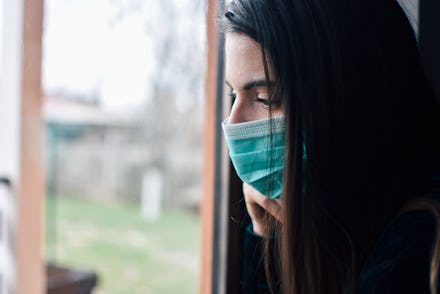The mental health effects of coronavirus can last long after the virus is gone

Doctors and scientists are only beginning to unravel the long-term health effects of the novel coronavirus. Although people who recover without requiring ventilators or intensive care probably won’t have lasting side effects, those who do may end up with lung damage and acute respiratory distress syndrome, when fluid accumulates in the air sacs inside the lungs. But the distressing, sometimes traumatizing, experience of catching the novel coronavirus may impact not only physical health, but mental health, too, psychiatrists tell Mic.
Most people who contract COVID-19 will experience some distress and bounce back, says Petros Levounis, professor and chair of the department of psychiatry at Rutgers New Jersey Medical School. But “a smaller number of people will develop significant symptoms and even cross over to bona fide psychiatric disorders, like PTSD [post-traumatic stress disorder]," which would require medication and supervision by a mental health professional.
Survivors of COVID-19 could develop PTSD symptoms later on. Flashbacks and nightmares might constantly remind them of their illness.
In COVID-19 patients, physical symptoms can trigger anxiety, which can, in turn, exacerbate physical symptoms, further worrying them, and so on, a snowball effect known as mental distress, explains David Spiegel, a psychiatrist and director of the Stanford Center on Stress and Health. “Your body’s reaction to your elevated level of stress can make it even worse, so you pay more attention to the symptoms.” Someone in the midst of this distress could develop, say, a headache, which might be a symptom of COVID-19 — but it could also stem from anxiety about their illness.
A lot remains unknown about the disease, “so anyone who is starting to get symptomatic is going to be worried about what the effects are,” Spiegel says. And, he adds, we tend to confuse the vividness with which we can imagine an outcome with its probability of happening. For instance, since we can visualize a plane crash more clearly than a car crash, we tend to fear flying more than driving, even though a car crash is more likely. By the same token, that the novel coronavirus has already drastically altered our lives can make the threat of it feel more real, even among those who aren’t very sick.
This mental distress might have long-term effects. Spiegel predicts that survivors of COVID-19 could develop PTSD symptoms later on. Flashbacks and nightmares might constantly remind them of their illness, Levounis says. Or, they might avoid or numb themselves to anything related to the virus, and even forget that they stayed in the ICU. Their traumatic experience might also make them view the world through a negative lens, or feel on edge all the time.
Many people experience PTSD after being discharged from the ICU, the Washington Post reports. It makes sense — after all, as Levounis points out, the experience involves intubation—which can be really scary —utter isolation, and fear not only for your own life, but others’ lives, too. “You know very well you’re carrying a deadly weapon,” he says. “That is psychologically taxing.” During extended periods of time in the ICU, patients can also suffer from what’s known as “ICU delirium,” characterized by terrifying hallucinations and confusion.
The psychological ripple effects of severe COVID-19 illness may last well after recovery. One small study showed that many survivors of acute respiratory distress syndrome, which, again, may be more likely in COVID-19 patients who need ventilation and intensive care, struggled with PTSD years later.
“The extreme fears of dying, of being debilitated, of being separated from your loved ones, are serious predictors of psychiatric problems,” including PTSD, Levounis tells Mic. He adds that COVID-19 might also result in panic disorder, generalized anxiety disorder, and/or depression. “One of the first responses of our psyche [to trauma] is to be depressed,” he explains. Such stressful events could also increase rates of relapse in survivors with alcohol use disorder.
That said, Levounis stresses that “even among people who experience the most severe forms of the illness” — resulting in prolonged ICU stays, the need for a ventilator, or dialysis treatments, for instance — “the majority will likely end up not developing PTSD or any other psychiatric disorder.”
But even if those who recover from COVID-19 don’t end up with psychiatric disorders, they might still struggle with other mental health issues. Vox cites one study which found that a year after the SARS outbreak, those who had recovered had psychological distress and elevated stress levels. People who have fallen ill with COVID-19 might also feel guilty about possibly infecting healthcare workers or loved ones, Levounis says.
Some might experience survivor’s guilt, or guilt over having survived a traumatic experience that killed others.
Neha Chaudhary, a child and adult psychiatrist at Massachusetts General Hospital, Harvard Medical School, told ABC News that some might experience survivor’s guilt, or guilt over having survived a traumatic experience that killed others.
The unprecedented nature of this pandemic makes its mental health effects tricky to predict, though, Levounis says. Most disasters, like Hurricane Sandy or September 11, occurred over shorter time periods and their distress, heroic, disillusionment, and recovery phases are well-documented in the literature. But in a pandemic like this one, the distress period bleeds into the heroic period — that is, as we celebrate frontline health workers, and people are recovering, others are still dying.
The lack of leadership at the federal level hasn’t helped matters. While past disasters have often brought Americans together, the current administration “is creating these deeper fissures in society and making people more anxious,” Spiegel says. (Case in point: the spate of stay-at-home protests across the country, after Trump’s tweets exhorting followers to “liberate” blue states.) A leader who we trust to help us can offer much-needed reassurance — “but this is the opposite of that.”